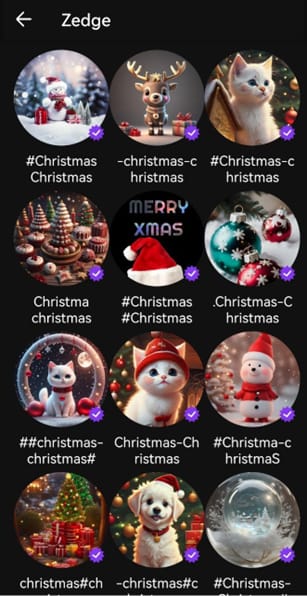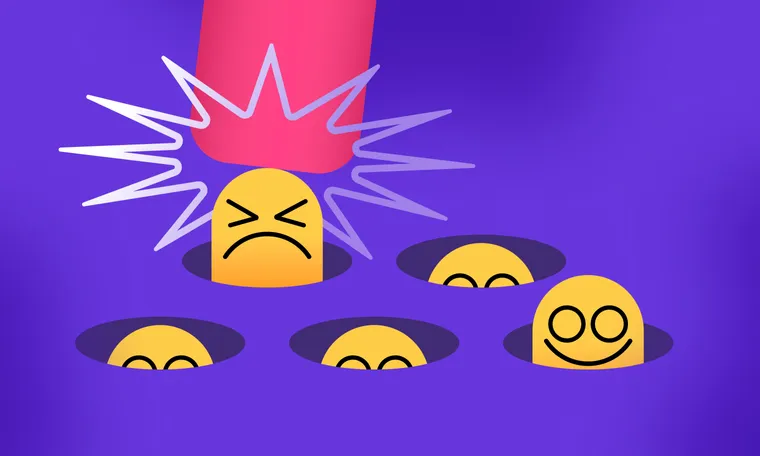We’ve explained before how and why Zedge Premium is an open marketplace. Ensuring just about anybody can join is important to us both philosophically and strategically, so we do not impose our own aesthetic judgements on the work artists can upload.
But there are some downsides to such an approach. The more artists that join our platform, the fiercer the competition for eyeballs becomes, and the harder some artists can find it to earn significant revenue if they’re not already appearing near the top of our feeds.
So it’s natural for those artists to seek any advantage they can. Some do so by creating ever more original and compelling art, which is what we recommend, and love to see. Others try instead to figure out what Zedge users download most, and make more art like that, which can also be a successful strategy, though it does lead to our feeds getting populated with a lot of similar items.
But a small percentage of our licensors (note that I do not call them artists because, although they can be VERY creative, they don’t spend much time actually creating anything) find it easier to cheat, and devote significant energy to gaming our system: looking for hacks to get themselves at the top of our feeds, finding ways to dominate search results, and/or downloading their own items repeatedly. Their behavior leads to a never-ending arms race in which Zedge has to implement technical solutions or craft new content policies to keep our app usable for consumers and equitable for artists, with every cheat we block leading to some new creative workaround, which begets a new technical solution or content policy, which yields a new workaround, and so on, presumably forever.
I’ve been dealing with this phenomenon at different digital marketplaces for over a quarter century now, and while the pattern itself never changes, the specific hacks are unpredictable, and can range from innocent experiments to outright criminal fraud.
An example of a hack that likely began as an innocent experiment by one artist but quickly got copied by hundreds of others is naming their profile after a popular holiday or category, so that they would always appear in searches for that particular term. The problem is that after the first artist named his profile, “Christmas,” multiple others decided to do him one better by naming theirs “Christmas Christmas” or “Christmas Christmas Christmas,” leaving everyone who followed to come up with ever odder ways to do something similar. The results were pretty ugly:

Note that squatting on a category such as “Christmas” or “Wallpapers” or “Hip-Hop” was already against our rules, so everyone in the screenshot above was trying to get around that rule by doubling the name. Which meant we had to revise our profile naming policy to clarify that, just as naming your profile “Christmas” was prohibited, so was repeating the name and/or adding special characters to the words.
Artists have gotten just as sneaky when titling and tagging individual items, often tagging images of landscapes with popular search terms such as Spider-Man or Naruto. Although this is a very common hack that we perhaps should have anticipated, I confess the thinking behind it befuddles me. I mean, sure, tagging your lovingly composed photograph of a beautiful tree “Spider-Man” will get it to appear somewhere within the endless scroll of results for one of our most popular searches, but what makes anyone think a user searching for Spider-Man images is going to want to download your picture of a tree?
Logic aside, that behavior led to yet another new rule: tags must accurately describe the item in question. I feel dumb just typing that out, as it strikes me as something so obvious it shouldn’t even need to be a rule in the first place.
We’ve also had to limit the number of items from a given artist that can appear in any particular feed, and then a bit later impose a limit on the number of items any one artist can upload in a month, as too many artists were trying to dominate our feeds through sheer volume – a trend that AI image generators have exacerbated greatly.
All of the hacks mentioned above are annoying, in that they degrade the user experience for Zedge’s customers, but they stop short of outright fraud. But some artists step so far over the line of what’s responsible that they venture into criminal territory. Our duplicate detector rejects thousands of items every week because they’re simply copies of popular items someone else has already uploaded. And the number of artists who apply to Zedge with original works, only to replace them all with images of Baby Yoda, Hello Kitty or DC/Marvel superheroes as soon as their application is approved is depressingly high.
Doing that gets you suspended from Zedge forever as soon as we see it, but some people were so thrilled with the money they could make before we found them that they’d keep sneaking back onto the platform using false credentials, requiring us to develop ever more elaborate identity verification mechanisms, and also update our license agreement to state explicitly that suspended artists forfeit all unpaid royalties.
The most straightforward way to appear in our popular feeds is for many users to download your items. So a lot of our Premium artists make their wallpapers available for free to obtain as many downloads as possible, then start charging for them once they've made it into our list of top items. This pattern angers a lot of other Premium artists, since it tends to drive down the market price for a wallpaper, so they regularly ask us to prohibit this behavior, but the tactic strikes me as perfectly legitimate: competition around price and quality is what one expects to find in any healthy marketplace.
Of course, another way to show up in those feeds is to download your own items yourself, over and over again – and if your items are ad gated, you can theoretically earn money on every single one of those downloads. That behavior IS prohibited by every digital marketplace I'm aware of, including Zedge, but identifying when it's happening is not a problem you can solve once and be done with.
For instance, it's easy enough to recognize when a single user keeps downloading his own items, but what if he's enlisted 50 friends to do the same, or set up bots to create new users on the fly?
That's why we refer to our efforts to combat such fraud Whack-A-Mole: each time we beat one down, another one pokes his head up, just out of arm's reach. We've established triggers to identify when any single user has downloaded more items than the average user ever does from a single artist, and mechanisms within the app to prevent any individual from downloading more than necessary in a single day, but doing so leads the more wily scammers to unleash armies of bots all downloading different numbers of items in order to determine what those triggers might be, so they can program their bots to download that number minus one before stopping. One such cheater figured out a way to generate just enough downloads of his own items to earn the $50 that triggered a monthly royalty payout. Then he'd cease all downloads for that account for the next month, and do the same thing for a different account he'd created (needless to say, individuals creating multiple accounts on Zedge is ALSO against the rules). He got away with it for about six months before we identified the pattern and set up new processes to identify and stop it.
The strategic thinking would almost be admirable if it weren't so annoying, and if it weren't taking money out of the pockets of artists who play by the rules. One thing I will never understand about these scammers is that they clearly have a lot of energy and intelligence, and often work harder than they'd have to if they just followed the rules. Sometimes I doubt it's the money that motivates them, as they seem more interested in simply beating the system for the thrill of it.
We suspend artists when we find them engaging in such download fraud, and it's endlessly amusing how some of them react not with appropriate shame, but with outraged insistence that Zedge is being unfair to THEM. This is a phenomenon I've encountered elsewhere: back in the aughts, when I was working for an online music subscription service called Rhapsody, we had set up similar triggers to identify artists who were receiving abnormal numbers of plays per user, as that was often an indication of fraud. Sometimes the explanation was benign – children's albums, for example, often had higher than average plays per user, simply because children LOVE repetition. But usually a little investigation would find that the user who played a given album twenty times a day every day of a given month was the lead singer in the band, or that band's manager. After kicking one such musician off our platform, he wrote a long, angry blog post about how he'd done nothing wrong. It was gratifying to see the comments quickly fill up with other musicians telling him what a clueless jerk he was being.
I get a lot of emails from suspended artists, which usually follow a similar pattern: they begin apologetically, insisting Zedge has made a mistake as they have done nothing wrong, But the longer we refuse to reverse our decision, the more that mask slips, and they often end by cursing my name, then laughingly insisting they have dozens of other accounts that have been breaking all the same rules, and daring us to find them.
To which I say: don't worry. We will.


